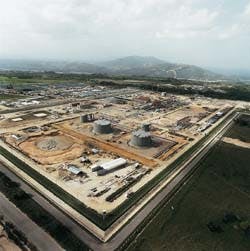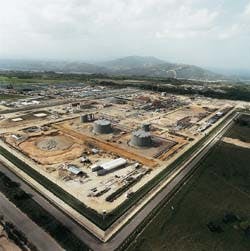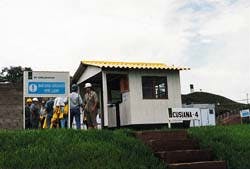BP Molds Security Strategy To Fit The Country
David Knott
Senior Editor
Central processing facility in Colombia's Cusiana oil field is shown during its construction phase. Security issues are a major concern for field operator British Petroleum Co. plc and other companies working in Colombia, among the most violence-plagued countries not at war. Photo courtesy of BP.
Security gate checkpoint is maintained at Cusiana oil field facilities by operator BP Exploration. Note barbed wire fence and sentry guard tower in background. Photo by David Knott.
British Petroleum Co. plc has a strong track record for upstream and downstream operations worldwide and continues to develop projects in promising regions around the world.
In recent years, a number of countries have been opened to foreign oil and gas companies that had been closed for decades. Political instability in some of these leads to major security concerns for foreign firms.
Among BP's recent campaigns are field developments in Colombia, Algeria, and Azerbaijan; marketing expansion in eastern Europe and Africa; and chemical plants in China and elsewhere in the Far East.
Most recently, BP has been subject to media allegations of links to human rights violations in Colombia, where troops are deployed by the government to prevent guerrillas from damaging oil field installations.
No matter how serious the allegations, BP has responded straightforwardly and patiently refuted them (OGJ, Apr. 21, 1997, p. 42). In such circumstances, how a company handles security can become a major issue.
BP has a well-established strategy for dealing with security, which allows a range of approaches to fit different ways of working in various countries and with a spectrum of political regimes.
The company's entire structure is built up of autonomous businesses, such as Colombian exploration and production or Chinese chemicals.
These businesses are further split into asset groups, which entail an asset or number of related assets, such as a refinery or a group of oil fields.
Security is seen as a servant of the businesses. Line managers in each of the businesses are responsible for all that happens in their business, including security.
Security organization
BP's security organization is headed by about a dozen regional security advisers who provide security advice and services to businesses in their own area.
Tony Ling, BP's regional security adviser for the Far and Middle East, explained that the company's security staff members are specialists in different areas of security.
Some come from the police force, some from the army, some from the Foreign Office, or even a civilian technical background, but they are generally "second career" people.
"In most cases," said Ling, "security staff 'live' in businesses with a heavy security bill but provide advice for other groups within their region. For example, our adviser in South Africa looks after operations in East Africa."
Although BP has its internal security network, the bulk of the day-to-day guard work is contracted out to local security firms, in keeping with the company's policy on outsourcing.
Security work
The work of the BP security staff is widespread and includes:
- Identifying threats and risks to operations on behalf of the businesses.
- Helping businesses prioritize responses to threats.
- Protecting information, including information technology security.
- Audits and investigations.
- Contingency planning.
- Organizing security exercises.
The security network acts as a semi-formal forum, making sure its own specialist areas interlock and ensuring security works smoothly together with other disciplines.
Most of BP's security operations involve working directly with host governments and their security forces. BP security people maintain a steady liaison with government agencies.
While the government forces always handle serious security incidents, BP's staff takes care of security education for expatriate workers, the local staff, and contractors and maintaining awareness of security needs.
"With host governments, we are very much a guest," said Ling. "Most of our work is guided by common sense. We don't get involved in military issues, but if the military is protecting an operation, we want it to operate in a well-organized way."
As a guest, BP strictly observes the laws of the host country. The company does not operate private armies and does not put police on its payroll, despite what some media coverage has alleged, although it maintains strong links with police forces in every country.
In countries such as Colombia, state oil company operations are often protected by the army acting as an agent of government. The army has the right to operate in the area, and as a venture partner with the state oil firm, BP cooperates with the forces as much as possible.
Situations
In exercises, where, for example, takeover of a platform by a protest group is played out, staff security forces would step forward to offer advice initially, but security authorities actually handle the incident.
"Clearly there are specific problems in specific areas," said Ling. "Some areas are prone to fraud, some to attacks on retail outlets, for example. Every town has its own set of risks."
BP always builds strong links with local communities and is open about operations, including security. The company likes local people to feel they have a stake in what it is doing.
"Where we have to have physical security," said Ling, "we like it to be as little intimidating as possible. Often we have to have access control, though. One clearly would not invite the IRA, say, into a building to look round."
The security group is usually consulted right at the beginning of any project, especially if it involves entry to a new country or area.
"If a business asks for a security review when a project is only a twinkle in a manager's eye," said Ling, "this is the surest indicator of our success. It means security is being seen as part of the operational process.
"Identifying and managing risk is what we are about. There are very few countries in which an oil company cannot operate. Most risk is manageable, but it cannot be eliminated completely."
Copyright 1997 Oil & Gas Journal. All Rights Reserved.


